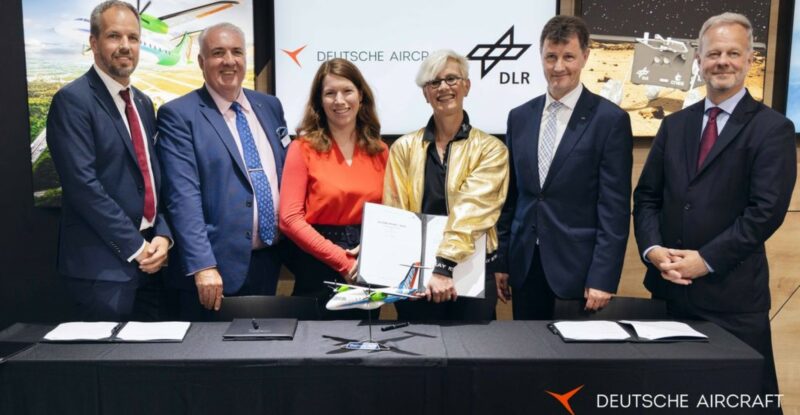 Deutsche Aircraft has won the public tender with the German Aerospace Centre (DLR) for the step-by-step conversion of a Dornier 328 Turboprop into a flying testbed. The procurement, conversion and use as a flying testbed is part of the UpLift project for research into technologies for the use of hydrogen in aviation. By converting the D328, a classic regional aircraft, into a flying testbed, a bridge will be built between research and practice.
Deutsche Aircraft has won the public tender with the German Aerospace Centre (DLR) for the step-by-step conversion of a Dornier 328 Turboprop into a flying testbed. The procurement, conversion and use as a flying testbed is part of the UpLift project for research into technologies for the use of hydrogen in aviation. By converting the D328, a classic regional aircraft, into a flying testbed, a bridge will be built between research and practice.
DLR will act as the project manager for UpLift. Deutsche Aircraft is one of the project partners and will contribute its expertise as an aircraft manufacturer. The plan is to test pioneering propulsion, fuel and system technologies under real flight conditions in order to accelerate research and development. The funding for 2023 to 2025 is part of the German Federal Ministry for Economic Affairs and Climate Protection (BMWK) aviation research program LuFo Klima, which is how the German government is supporting the aviation industry on its way to CO2 neutrality and climate compatibility.
German OEM for the future of German aviation
The D328, EASA’s large aircraft class (“CS25”), provides the ideal platform for demonstrating new components and systems under test since it has a wide stand-up cabin which allows for various modular options. Aside from the space, the turboprop boasts a 30,000-foot flight ceiling, an upgradeable flight deck, the option to convert to 100% SAF, and strong field performance. The overall high performance and robustness of the aircraft, the expandable cockpit and, last but not least, the possibility of testing SAF (sustainable aviation fuel) and, in the future, hydrogen or other sustainable energy sources in flight, make the D328 the perfect tool for the research project. Future system technologies, fuel cells, fuel systems and their integration will play an important role here.
Furthermore, the OEM Deutsche Aircraft brings in the technological expertise and know-how to support DLR’s research activities in UpLift. Deutsche Aircraft is also a partner to science and industry in other LuFo projects, working together to pave the way to climate-compatible aviation. Those relationships are an important component of the German aviation ecosystem, also in terms of developing chances for future aviators.
Dr. oec. Jasmin Eberharter, Head of Research and Technology programs at Deutsche Aircraft, emphasizes: “The path towards climate-neutral flights is a joint effort between the whole aviation ecosystem. With UpLift, aviation experts have a significant opportunity to join forces across science and industry, further contributing and accelerating sustainable aviation.”
Prof. Dr.-Ing. Anke Kaysser-Pyzalla, Chairwoman of the DLR Executive Board, says, “The new D328 UpLift research aircraft will perfectly complement DLR’s research fleet as a flying test laboratory for hydrogen technologies and pave the way for a new generation of climate-compatible aircraft in the regional aircraft class. This new fleet member, in close partnership with the aviation industry, the air transport industry as well as SMEs and start-ups, gives DLR the opportunity to test disruptive approaches in the development of new propulsion systems including hybrid-electric concepts based on hydrogen technologies and novel fuels up to the flight test stage.”
The D328 is particularly suitable for assessing innovative propulsion technologies in flight due to its specific design characteristics. In addition, the D328 is used worldwide for regional commercial flights with usual propulsion technologies, providing a wealth of reference values for the evaluation of new technologies. Dave Jackson, CEO of Deutsche Aircraft, emphasized what this agreement meant for the future developments: “The UpLift Programme and the D328 as a test platform is an important step towards paving the way for the future of the aviation industry. The D328 as a flying testbed platform will be crucial in laying out the groundwork for needed technological advancements.” Nico Neumann, COO of Deutsche Aircraft, is proud to have a D328 in DLR’s fleet. He states that: “We are fully committed to support as an OEM the integration of emerging technologies, to move aviation and technologies towards climate neutral flights.”
About Deutsche Aircraft
Deutsche Aircraft is a German aircraft manufacturer built on the heritage of aviation pioneers that continues to propel the aviation industry forward with innovative solutions. Supported by a highly skilled and passionate team of international engineers and aviation experts, Deutsche Aircraft is developing the most advanced regional aircraft on the market: the D328eco. As type certificate holder and service partner for existing D328 (both prop and jet) operators worldwide, the company is uniquely positioned to complement the existing fleet with this next-generation aircraft.
Deutsche Aircraft employs the latest technologies and best practices to ensure the highest levels of reliability, efficiency and sustainability for the D328eco. As a strategic partner for the sustainable development of regional air transport, Deutsche Aircraft is working with key players in the industry to achieve climate-neutral flights.
DLR at a glance
DLR is the Federal Republic of Germany’s research centre for aeronautics and space. They conduct research and development in aeronautics, space, energy and transport, security and digitisation. The German Space Agency at DLR is responsible for planning and implementing German space activities on behalf of the Federal Government. Two DLR project management agencies oversee funding programs and support knowledge transfer.
Globally, climate, mobility and technology are changing. DLR uses the expertise of its 55 institutes and facilities to develop solutions to these challenges. The 10,000 employees share a common mission: To explore the Earth and outer space and develop technologies for a sustainable future. In this way, they help to strengthen Germany as a centre of knowledge and business.
Featured image credited to Deutsche Aircraft










